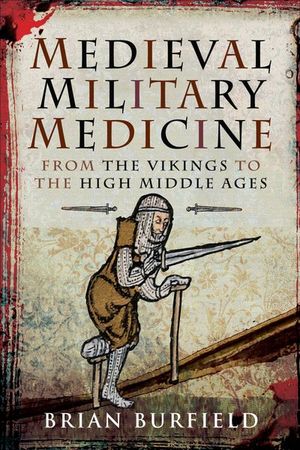Medieval Military Medicine
Published by Pen & Sword Books
A study of how doctors and surgeons treated the brutal injuries and illnesses suffered by medieval combatants.
Soldiers of the Middle Ages faced razor-sharp swords and axes that could slice through flesh with gruesome ease, while spears and arrows were made to puncture both armor and the wearer, and even more sinister means of causing harm produced burns and crush injuries. These casualties of war during the 500-year period between the ninth and thirteenth centuries in Northern and Western Europe are the focus of Brian Burfield’s study, but they represent just a portion of the story—disease, disability, disfigurement, and damaged minds all played their roles in this awful reality.
Surgical methods are described in the book, as are the fixes for fractured skulls, broken bones, and damaged teeth. Disfiguring scars and disabling injuries are examined alongside the contemporary attitudes toward them. Also investigated are illnesses like dysentery and St. Anthony’s Fire, plus infected wounds which were often deadlier than the weapons of the age. A final chapter on the psychological trauma caused by war is included and contains a significant focus on the world of the Vikings. Burfield’s account features many individual cases, extracting their stories of wounds, sickness, and death from chronicles, miracle collections, surgeries, government records, and other documents. The prose, poetry, and literature of the period are also of great value in bringing these cases to life, as is the evidence provided by modern archaeological and historical scholarship.
Soldiers of the Middle Ages faced razor-sharp swords and axes that could slice through flesh with gruesome ease, while spears and arrows were made to puncture both armor and the wearer, and even more sinister means of causing harm produced burns and crush injuries. These casualties of war during the 500-year period between the ninth and thirteenth centuries in Northern and Western Europe are the focus of Brian Burfield’s study, but they represent just a portion of the story—disease, disability, disfigurement, and damaged minds all played their roles in this awful reality.
Surgical methods are described in the book, as are the fixes for fractured skulls, broken bones, and damaged teeth. Disfiguring scars and disabling injuries are examined alongside the contemporary attitudes toward them. Also investigated are illnesses like dysentery and St. Anthony’s Fire, plus infected wounds which were often deadlier than the weapons of the age. A final chapter on the psychological trauma caused by war is included and contains a significant focus on the world of the Vikings. Burfield’s account features many individual cases, extracting their stories of wounds, sickness, and death from chronicles, miracle collections, surgeries, government records, and other documents. The prose, poetry, and literature of the period are also of great value in bringing these cases to life, as is the evidence provided by modern archaeological and historical scholarship.
BUY NOW FROM
COMMUNITY REVIEWS

